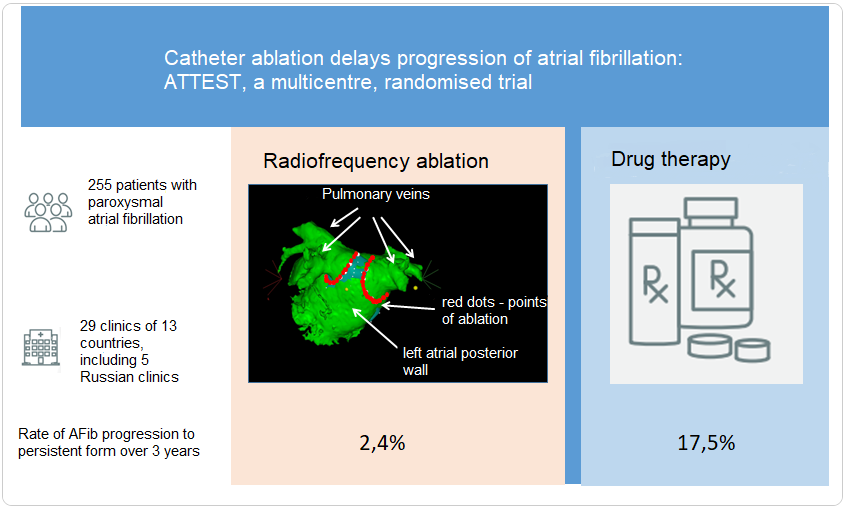Some days ago, EP Europace (a peer-reviewed medical journal published by Oxford University Press that publishes research articles about the study and management of cardiac arrhythmias) published the results of a long-term clinical trial on the prevention of atrial fibrillation (AF) progression, involving specialists from Almazov Centre.
Atrial fibrillation is the most common sustained cardiac arrhythmia resulting in irregular pulse. During atrial fibrillation, the muscle fibers of the atria contract chaotically leading to a fast and irregular heartbeat.
Atrial fibrillation increases the risk of blood clot formation in the heart and is a common risk factor for ischemic stroke. The risk of stroke is 7 times higher in people with AF as compared with those without AF. Besides, people with atrial fibrillation run an increased risk of heart failure and early death.
Catheter ablation as a method for minimally invasive treatment of fibrillation appeared about 20 years ago. Until now, doctors did not have data on how effectively ablation in the early stages of the disease prevents the progression of arrhythmia to a persistent form associated with a higher risk of complications. Thanks to the conducted research, we can now confidently say that after ablation, the chance of developing a persistent form of arrhythmia is 10 times lower,” explains the Principal Investigator of the project at Almazov Centre, head of Arrhythmology Research Department, Professor of RAS Dmitry Lebedev.
A total of 255 patients with atrial fibrillation aged 65 and older (29 medical centres from 13 countries) took part in the trial. Each patient was followed up for 3 years; half of them continued drug therapy for arrhythmias, while the rest underwent ablation.

“It took us six years to properly and consistently include the patients, monitor their condition and come to certain conclusions. Each individual was followed up regularly for three years, and also sent us ECGs from a portable wearable device. To do this, it was necessary to maintain constant close communication with people, and Russian researchers could deal with this task most successfully. Now we are convinced of the need for an earlier application of catheter ablation to treat arrhythmias and improve the outcomes in our patients,” adds the trial participant, Head of Neuromodulation Research Laboratory, Evgeny Mikhailov.


